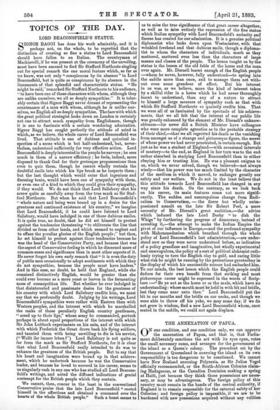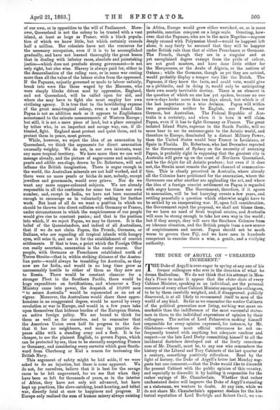THE ANNEXATION OF PAPUA.
ON one condition, and one condition only, we can approve the annexation of Papua, and that is, that Parliament deliberately sanctions the act with its eyes open, votes the small necessary sums, and arranges for the government of the island as a Queen's colony. The precedent set by the Government of Queensland in annexing the island on its own responsibility is too dangerous to be sanctioned. We cannot have New Zealand annexing Polynesia, as Sir Julius Vogel officially recommended, or the South-African Colonies claiming Madagascar, or the Canadian Dominion making a spring at Haiti, just because they think those possessions are necessary, or may be advantageous. The foreign policy of this country must remain in the hands of the central authority, if England is to remain responsible for the external safety of her Colonies ; and foreign policy is impossible, if we are to be burdened with new possessions acquired without any volition of our own, or in opposition to the will of Parliament. Moreover, Queensland is not the colony to be trusted with a vast island, at least as large as France, with a black population of which we know little, but which certainly exceeds half a million. Her colonists have not the resources for the necessary occupation, even if it is to be accomplished gradually, and have not learned thoroughly the great lesson that in dealing with inferior races, absolute and painstaking justice—which does not preclude strong government—is not only right, but also wise. Slavery is always paid for, either in the demoralisation of the ruling race, or in some war costing more than all the value of the labour stolen from the oppressed. If the Papuans, unjustly governed or made to labour unfairly, break into wars like those waged by the Maroons, who were simply blacks driven mad by oppression, England, and not Queensland, will be called upon for aid, and where she may have to fight she must employ her own civilising agency. It is true that to the bewildering expanse of the great semi-tropical colony, even a vast island like Papua is not an addition such as it appears to Englishmen accustomed to the minute measurements of Western Europe ; but still, it is not a mere piece of land, but a place occupied by tribes who, in an imperfect and savage way, can, if illtreated, fight. England must protect and quiet them, and to protect them in peace, must govern.
While, however, we reject the idea of an annexation by Queensland, we think the arguments for direct annexation unusually weighty. We do not, in our own interests, want any more tropical territory. We have more than we can well manage already, and the picture of sugar-canes and minerals, pearls and edible sea-slugs, drawn by Dr. Robertson, will not inflame the British imagination. There is sugar enough in the world, the Australian minerals are not half worked, and if there were no more pearls or beche de mer, nobody, except jewellers and gourmands, would ever grieve. Nor do we want any more copper-coloured subjects. We are already responsible in all the continents for some ten times our own number, and, except in India, we have not been successful enough to encourage us in voluntarily seeking for further work. But least of all do we want a position in which we should be thrown into direct collision with Germany or France, under circumstances in which the suspiciousness of our people would give rise to constant panics; and that is the position into which, if we reject Papua, we may be thrown. It is the belief of the Queenslanders, and indeed of all Australians, that if we do not claim Papua, the French, Germans, or Italians, who are regarding all tropical islands with hungry eyes, will seize it, and use it for the establishment of convict settlements. If that is true, a point which the Foreign Office can easily ascertain, annexation is the easier course. Our people, with Germans or Frenchmen established north of Torres Straits—that is, within striking distance of the-Australian ports—would always be trembling for Australia, as they now are for India, and would in no long time grow as unreasonably hostile to either of them as they now are to Russia. There would be constant clamour for a stronger Fleet in the Southern Pacific, there would be huge expenditure on fortifications, and whenever a Tory Ministry came into power, the despatch of 10,000 men " to secure Australia ' would be represented as an act of vigour. Moreover, the Australians would share these apprehensions in an exaggerated degree, would be moved by every revolution or war in Europe, and would in a few years take upon themselves that hideous burden of the European States, an active foreign policy. We are bound to think for them as well as for ourselves, and to remember that the American Union owes half its progress to the fact that it has no neighbours, and may in practice dispense alike with a standing army and a fleet. It is far cheaper, to use the plainest English, to govern Papua, which can be protected by sea, than to be eternally suspecting France or Germany, and considering every corvette which goes Southward from Cherbourg or Kiel a reason for increasing the British Navy.
This argument of safety might be laid aside, if we were asked to do an injustice, but there is none apparent. We do not, for ourselves, believe that it is best for the savage races to be left ungoverned, for we see that when they have been so left for thousands of years, as in the interior of Africa, they have not only not advanced, but have kept up practices, like slave-catching, head-hunting, and tribal war, directly fatal at once to happiness and progress. If Europe only realised the sum of human misery always existing in Africa, Europe would grow either wretched, or, as is more probable, sanction conquest on a large scale. Granting, however, that the Papuans, who are in the main Negritos—negroes deeply crossed with Polynesian blood—would be happiest left alone, it may fairly be assumed that they will be happier under British rule than that of either Frenchmen or Germans. The French, though they are in a singular and as yet unexplained degree exempt from the pride of colour, are not good masters, and have done little either for the Marquesans, or the Arabs of Algeria, or the natives of Guiana ; while the Germans, though as yet they are untried, would probably display a temper very like the Dutch. The Papuans, if they knew the facts, and could vote, would give us a plebiscite, and in doing it, would only be anticipating their own nearly inevitable destiny. There is an element in the question of which no one has yet spoken, because no one now-a-days looks more than ten days ahead, but which is of the last importance to a wise decision. Papua will within two generations neither be English, nor French, nor German, but Australian. The Federal Republic of Australia is a certainty, and when it is born it will claim Papua, even if it has to fight Germany or France. The great isolated Island State, supreme in the South Pacific, will no more bear to see its entrance-gate to the Asiatic world, and therefore to Europe, dominated by a distant Military Power, than the United States would bear France in Louisiana, or Spain in Florida. Dr. Robertson, who last December reported to the Government of Sydney on the necessity of annexing Papua, is probably right in supposing that the greatest city in Australia will grow up on the coast of Northern Queensland, and be the depot for all Asiatic produce ; but even if it does not, the Straits must remain the grand channel of communication. This is clearly perceived in Australia, where already all the Colonies have petitioned for the annexation, where the Governors one after another are applauding the act, and where the idea of a foreign convict settlement on Papua is regarded with angry horror. The Government, therefore, if it agrees to annexation, will be but hurrying events a few years, and settling peacefully a question which otherwise might have to be settled by an exasperating war. If, upon full consideration, the Government reject the proposal, we shall not blame them, for we have no need of fresh tropical estates, and Australia will soon be strong enough to take her own way in the world ; but if they accept, they will save the Southern Colonies from an irksome situation, and the British people from a new source of suspiciousness and unrest. Papua should not be much worse to govern than Fiji, and we have men in hundreds competent to exercise there a wise, a gentle, and a vivifying authority.



































 Previous page
Previous page